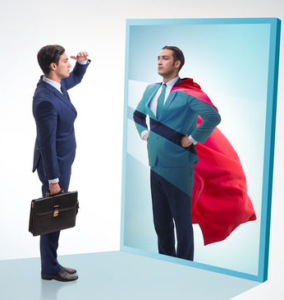Click here to download a PDF of this article: We Don’t See What We Don’t See
Click here for an audio of this article:
Humans have a knack for self-deception. Really. 
As humans, the relationship of our emotions and our intellect is a fluid one. We are capable of self-deception, believing the stories that we tell about ourselves without listening to – and seeking out – the critical counsel of others. These little internal lies seem to amount to nothing, but, over time, can lead to an illusion of superiority. We often see this better than others, without realizing we all do it.
Decades ago, psychologist Leon Festinger coined the concept of cognitive dissonance, the discord between our actions and beliefs; we can either change our actions or our beliefs and, most often, we go into mental gymnastics to rationalize our actions when we act outside of our beliefs. Familiar refrains are: I deserve the expensive car; I should have the largest office; saving for my kid’s education is important, but they will learn if they travel with me to Europe; it’s ok to cheat on my diet/workout as I will make it up tomorrow. Early in my own career I learned this: I could think quickly and see the intellectual pros and cons in decisions (making me “smart”), but I overlooked a deep understanding of the human emotions and relationships involved. My self-deception at that time was that people in business valued logic above relationships; thus, being smart was important, which fed my ego. The cost was reduced engagement. Trust was not fed by being smart, it was cultivated by demonstrating a commitment to human relationships.
Renowned physicist Richard Feynman said this: “The first principal is that you must not fool yourself – and you are the easiest person to fool.” Leaders must accept that they have places of self-deception. This is not a condemnation of the self; it is recognizing the imperfections of the self. Biologically, our brains are layered, with different areas focused on different things and our reptilian brain operating faster than our intellectual brain. One of the most dangerous self-illusions is termed the Dunning-Kruger effect, where we fail to recognize our level of ability and overestimate it (and this occurs more often when we are less-skilled at something). Our reptilian brain convinces us of our self-importance, while the intellectual brain can stand by without critical contemplation. It is inexcusable to hold a set of internal moralities without critically assessing our own behaviors in those contexts. The call of leadership requires a higher standard.
Leadership is a continual dance of confidence and humility. If your self-assurance is overriding critical remarks from those you lead, you would benefit from paying closer attention to yourself. If you do not have a person in your life that will call out your self-deception, then get one. Think of this person not as an adversary, but as someone who will sit with you by the fire (so to speak), pay attention to your actions, knows your belief system, and then opens a dialog with you where you could build better alignment with the leader you seek to be. Leadership requires robust confidence, tempered with robust self-assessment.

